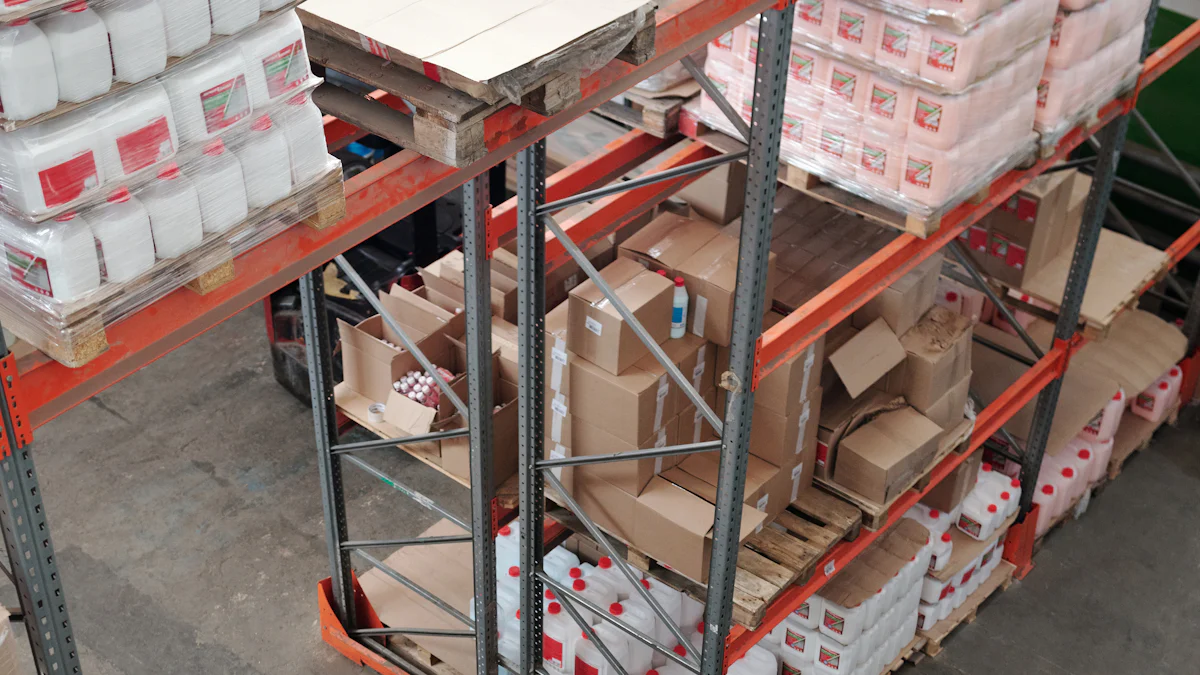Innovative Supply Chain Solutions: How JUSDA Enhanced Efficiency and Reduced Costs for SHARP

In today's competitive market, efficient supply chain management is crucial for businesses aiming to reduce costs and enhance operational effectiveness. Companies with optimized supply chains experience 15% lower costs and significantly faster cash cycles. JUSDA, a leader in Supply Chain Solutions, exemplifies this efficiency through its collaboration with SHARP. By leveraging advanced technologies like AI and IoT, JUSDA has transformed SHARP's supply chain, achieving remarkable improvements in cost control and operational efficiency. This partnership highlights the importance of innovation in maintaining competitiveness and sustainability in the modern business landscape.
Understanding Supply Chain Challenges
Common Issues in Supply Chains
Supply chains often face a myriad of challenges that can hinder their efficiency and increase operational costs. Two primary issues include inefficiencies and high costs.
Inefficiencies
Inefficiencies in supply chains can arise from various factors, such as poor inventory management, lack of real-time data, and outdated processes. These inefficiencies lead to delays, increased labor costs, and reduced customer satisfaction. JUSDA addresses these issues by implementing advanced technologies like AI and IoT devices. These technologies optimize inventory management practices, ensuring that stock levels are precise and demand patterns are accurately predicted. This approach minimizes delays and enhances overall operational efficiency.
High Costs
High costs in supply chains often stem from excessive resource usage, manual processes, and errors in logistics operations. JUSDA's smart supply chain solutions focus on reducing these operational costs. By leveraging automation and streamlined inventory management, JUSDA significantly reduces human error and increases efficiency. This results in substantial cost savings for businesses, allowing them to allocate resources more effectively.
The Need for Innovation
In the face of these challenges, innovation becomes crucial for maintaining competitiveness and sustainability in supply chain management. Two key areas where innovation plays a vital role are technological advancements and strategic partnerships.
Technological Advancements
Technological advancements have revolutionized supply chain operations. JUSDA emphasizes seamless technology integration to unlock operational synergies and enhance decision-making processes. For instance, JusLink's Warehouse Management System (WMS) offers real-time inventory tracking and insights into stock availability. This technology provides precise control over stock levels, leading to improved operational efficiency and cost reduction. By utilizing advanced algorithms and real-time data analysis, JUSDA enhances logistics operations and decision-making processes.
Strategic Partnerships
Strategic partnerships are essential for fostering innovation in supply chains. Collaborations between companies like JUSDA and SHARP demonstrate the power of strategic partnerships in overcoming supply chain challenges. By working together, these companies can share resources, expertise, and technologies to achieve common goals. Strategic partnerships enable businesses to implement customized solutions that address specific supply chain issues, resulting in enhanced efficiency and reduced costs.
Strategic partnerships are essential for fostering innovation in supply chains. Collaborations between companies like JUSDA and SHARP demonstrate the power of partnerships in overcoming supply chain challenges. By working together, these companies can share resources, expertise, and technologies to achieve common goals. Strategic partnerships enable businesses to implement customized solutions that address specific supply chain issues, resulting in enhanced efficiency and reduced costs.
JUSDA's Approach to Supply Chain Solutions
Core Principles
Customer-Centric Solutions
JUSDA places customers at the heart of its supply chain solutions. By understanding the unique needs and challenges of each client, JUSDA tailors its services to deliver maximum value. This customer-centric approach ensures that solutions are not only effective but also aligned with the strategic goals of the businesses they serve. For instance, JUSDA's collaboration with SHARP exemplifies this principle. They customized logistics operations to address SHARP's specific requirements, resulting in a 30% reduction in freight expenses. This focus on customer needs enhances satisfaction and fosters long-term partnerships.
Data-Driven Decision Making
In today's data-rich environment, making informed decisions is crucial for supply chain success. JUSDA leverages advanced analytics and big data to drive its decision-making processes. By analyzing vast amounts of data, JUSDA identifies trends, predicts demand, and optimizes inventory levels. This data-driven approach minimizes risks and maximizes efficiency. For example, JUSDA's use of real-time data analytics allowed SHARP to streamline its operations, leading to significant improvements in logistics performance. Data-driven strategies enable JUSDA to offer precise and reliable supply chain solutions.
Implementation Strategies
Process Optimization
JUSDA excels in optimizing supply chain processes to enhance efficiency and reduce costs. By evaluating existing workflows and identifying bottlenecks, JUSDA implements targeted improvements. These optimizations include refining transportation routes, enhancing warehouse operations, and automating repetitive tasks. The result is a streamlined supply chain that operates smoothly and efficiently. JUSDA's process optimization efforts have consistently led to reduced lead times and improved service quality for its clients.
Technology Integration
Technology plays a pivotal role in JUSDA's supply chain solutions. By integrating cutting-edge technologies such as IoT and AI, JUSDA enhances visibility and control over supply chain operations. These technologies enable real-time tracking, predictive maintenance, and automated decision-making. JUSDA's JusLink platform exemplifies this integration by providing comprehensive insights into supply chain activities. Through technology integration, JUSDA empowers businesses to achieve greater operational efficiency and cost savings.
Enhancing Efficiency with JUSDA

Streamlining Operations
JUSDA excels in streamlining operations through innovative Supply Chain Solutions. By leveraging advanced technologies, they enhance efficiency and reduce operational complexities.
Automation
Automation stands as a cornerstone of JUSDA's strategy to streamline operations. They utilize AI and machine learning to automate repetitive tasks, reducing human error and increasing speed. This approach allows for agile responses to market demands, ensuring that supply chain processes remain efficient and effective. Automation not only accelerates order processing times but also optimizes resource utilization, leading to significant cost savings.
Lean Management
JUSDA implements lean management principles to eliminate waste and improve process efficiency. By focusing on value-added activities, they ensure that every step in the supply chain contributes to overall productivity. Lean management involves continuous evaluation and refinement of processes, which results in reduced lead times and enhanced service quality. JUSDA's commitment to lean practices ensures a seamless flow of goods from raw material procurement to final product delivery.
Improving Communication
Effective communication is vital for a well-functioning supply chain. JUSDA enhances communication through real-time tracking and collaborative platforms, ensuring transparency and coordination among all stakeholders.
Real-Time Tracking
Real-time tracking provides visibility into every stage of the supply chain. JUSDA employs IoT devices and cloud platforms to monitor shipments and inventory levels continuously. This technology enables businesses to track their goods in real-time, reducing uncertainties and improving decision-making. Real-time tracking ensures timely deliveries and enhances customer satisfaction by providing accurate information about order status.
Collaborative Platforms
Collaborative platforms facilitate seamless communication between different supply chain partners. JUSDA's platforms integrate data from various sources, allowing stakeholders to share information and collaborate effectively. These platforms support complex and variable customer demands by providing a centralized hub for communication. By fostering collaboration, JUSDA ensures that all parties work towards common goals, resulting in improved efficiency and reduced costs.
Cost Reduction Techniques
Reducing Operational Costs
Efficient resource allocation plays a pivotal role in reducing operational costs within supply chains. Companies must strategically allocate resources to ensure optimal utilization. By analyzing demand patterns and production schedules, businesses can allocate resources where they are most needed, minimizing idle time and maximizing productivity. This strategic approach not only enhances efficiency but also reduces unnecessary expenditures.
Resource Allocation
Effective resource allocation involves distributing resources such as labor, materials, and equipment in a manner that maximizes output while minimizing waste. Companies like JUSDA employ advanced analytics to forecast demand accurately, allowing them to allocate resources efficiently. This proactive approach ensures that resources are available when needed, reducing delays and enhancing overall supply chain performance.
Waste Minimization
Minimizing waste is another critical aspect of reducing operational costs. Waste can occur at various stages of the supply chain, from production to distribution. Implementing lean management principles helps identify and eliminate non-value-added activities, thereby reducing waste. JUSDA's commitment to lean practices ensures that every step in the supply chain adds value, resulting in cost savings and improved efficiency.
Financial Management
Financial management is essential for maintaining a cost-effective supply chain. Companies must adopt robust budgeting and cost analysis techniques to control expenses and optimize financial performance.
Budgeting
Budgeting involves planning and controlling financial resources to achieve organizational goals. Companies should establish clear budgets for each supply chain activity, ensuring that expenditures align with strategic objectives. By setting realistic budgets and monitoring expenses, businesses can identify cost-saving opportunities and prevent overspending.
Cost Analysis
Cost analysis involves evaluating the costs associated with supply chain operations to identify areas for improvement. By conducting thorough cost analyses, companies can pinpoint inefficiencies and implement corrective measures. JUSDA utilizes data-driven insights to perform comprehensive cost analyses, enabling them to optimize supply chain processes and achieve significant cost reductions.
Survey Results: Nearly two-thirds of survey respondents prioritize supply chain and manufacturing costs over cuts in labor and other types of overhead. This trend underscores the importance of implementing effective cost reduction techniques in supply chains.
By focusing on these cost reduction techniques, businesses can enhance their Supply Chain Solutions, leading to improved efficiency and substantial cost savings.
Case Study: SHARP's Transformation

Initial Challenges
Supply Chain Bottlenecks
SHARP faced significant supply chain bottlenecks that impeded its operational efficiency. These bottlenecks arose from outdated logistics processes and inadequate inventory management systems. The lack of real-time data visibility led to delays in order fulfillment and increased lead times. SHARP struggled to maintain optimal stock levels, resulting in either overstocking or stockouts. These inefficiencies not only disrupted the supply chain flow but also affected customer satisfaction and loyalty.
Rising Costs
Rising costs posed another major challenge for SHARP. The company experienced escalating expenses due to inefficient resource allocation and manual processes. High freight costs further strained SHARP's budget, impacting its profitability. The absence of automated systems led to increased labor costs and human errors, which compounded the financial burden. SHARP needed a strategic intervention to address these cost-related issues and enhance its overall supply chain performance.
JUSDA's Intervention
Customized Solutions
JUSDA stepped in with tailored Supply Chain Solutions to address SHARP's unique challenges. They conducted a thorough analysis of SHARP's existing supply chain processes to identify areas for improvement. JUSDA implemented advanced technologies like AI and IoT to optimize inventory management and streamline logistics operations. By customizing solutions to fit SHARP's specific needs, JUSDA achieved a remarkable 20% reduction in overall costs and a 30% decrease in freight expenses. This strategic approach not only resolved SHARP's bottlenecks but also enhanced its supply chain efficiency.
Implementation Process
The implementation process involved a series of strategic steps to ensure seamless integration of JUSDA's solutions into SHARP's supply chain. JUSDA began by automating repetitive tasks to minimize human error and reduce labor costs. They introduced real-time tracking systems to enhance visibility and control over inventory levels. JUSDA's JusLink platform facilitated effective communication among supply chain partners, ensuring coordination and transparency. This comprehensive implementation process transformed SHARP's logistics landscape, resulting in substantial cost savings and improved operational efficiency.
"JUSDA's innovative solutions revolutionized SHARP's supply chain, leading to enhanced efficiency and significant cost reductions."
Results Achieved by SHARP
Efficiency Gains
JUSDA's intervention in SHARP's supply chain led to remarkable efficiency gains. The implementation of advanced Supply Chain Solutions significantly improved operational processes.
Faster Delivery Times
SHARP experienced faster delivery times due to optimized shipping routes and modes of transportation. JUSDA's strategic approach reduced transit delays, ensuring that products reached their destinations promptly. This improvement enhanced customer satisfaction and strengthened SHARP's market position.
Improved Productivity
The integration of automation and real-time tracking systems boosted SHARP's productivity. By minimizing manual tasks and errors, JUSDA enabled SHARP to focus on core business activities. The streamlined operations resulted in a more agile and responsive supply chain, capable of adapting to market demands swiftly.
Cost Savings
JUSDA's Supply Chain Solutions also delivered substantial cost savings for SHARP. Through strategic cost management initiatives, SHARP achieved a significant reduction in overall supply chain expenses.
Reduced Overheads
JUSDA's efforts in optimizing logistics operations and streamlining procurement processes led to reduced overheads for SHARP. The company saw a 30% reduction in freight expenses, which contributed to lower operational costs. Additionally, energy efficiency measures resulted in a 7 percent decrease in electric and gas energy consumption, leading to an energy cost savings of more than 3 percent.
Increased Profit Margins
The cost savings achieved through JUSDA's interventions translated into increased profit margins for SHARP. By reducing unnecessary expenditures and enhancing resource allocation, SHARP improved its financial performance. The company's ability to maintain competitive pricing while delivering high-quality products further solidified its market presence.
"JUSDA's innovative solutions revolutionized SHARP's supply chain, leading to enhanced efficiency and significant cost reductions."
Lessons Learned from the SHARP Case
Importance of Innovation
Innovation plays a pivotal role in transforming supply chains. Companies like JUSDA demonstrate how embracing new technologies and methodologies can lead to significant improvements. By integrating advanced technologies such as AI and IoT, JUSDA has shown that innovation is not just about adopting new tools but also about rethinking processes to enhance efficiency.
Staying Competitive
In today's fast-paced market, staying competitive requires constant innovation. Companies must prioritize research and development (R&D) investments to stay ahead. By fostering cross-functional collaboration and embracing agile methodologies, businesses can adapt quickly to market changes. This proactive approach ensures that companies remain relevant and competitive, even in dynamic environments.
Adapting to Change
Adapting to change is crucial for long-term success. Companies that embrace innovation can better navigate market fluctuations and emerging trends. By developing an innovation culture and investing in technology, businesses can enhance their operational efficiency and achieve sustainable growth. JUSDA's success with SHARP highlights the importance of being adaptable and open to change in supply chain management.
Role of Strategic Partnerships
Strategic partnerships are essential for overcoming complex supply chain challenges. They enable companies to share resources, expertise, and technologies, leading to improved quality and reduced costs. JUSDA's collaboration with SHARP exemplifies how strategic partnerships can drive innovation and enhance supply chain performance.
Collaboration Benefits
Collaboration offers numerous benefits, including access to new markets, technologies, and distribution channels. By working closely with partners, companies can implement customized solutions that address specific supply chain issues. This collaborative approach not only improves efficiency but also accelerates speed to market, giving businesses a competitive edge.
Long-Term Success
Long-term success in supply chain management relies on building strong partnerships. Companies that prioritize supplier relationship management and innovation partnerships will thrive in the future. By setting clear goals and working closely with partners, businesses can achieve sustainable growth and operational efficiency. JUSDA's partnership with SHARP demonstrates how strategic initiatives can lead to long-term success in supply chain solutions.
Future Trends in Supply Chain Management
Emerging Technologies
The landscape of supply chain management is rapidly evolving, driven by the integration of emerging technologies. These advancements are reshaping how businesses operate, offering new opportunities for efficiency and innovation.
AI and Machine Learning
Artificial Intelligence (AI) and Machine Learning (ML) are at the forefront of this technological revolution. Companies are increasingly utilizing AI-driven control towers to enhance decision-making processes. These systems provide real-time insights into supply chain operations, enabling businesses to predict demand patterns and optimize inventory levels. Machine learning algorithms analyze vast amounts of data to identify trends and anomalies, allowing for proactive adjustments in logistics strategies. This data-driven approach not only improves operational efficiency but also enhances customer satisfaction by ensuring timely deliveries.
Blockchain
Blockchain technology is another transformative force in supply chain management. It offers a decentralized and secure way to record transactions, providing transparency and traceability across the supply chain. By implementing blockchain, companies can ensure the authenticity of products and reduce the risk of fraud. This technology also facilitates seamless collaboration among supply chain partners, as all parties have access to a single source of truth. The integration of blockchain enhances trust and accountability, leading to more efficient and reliable supply chain operations.
Sustainability Practices
As environmental concerns continue to rise, sustainability has become a critical focus in supply chain management. Companies are adopting eco-friendly practices to minimize their environmental impact and meet consumer demands for sustainable products.
Eco-Friendly Solutions
Businesses are increasingly implementing eco-friendly solutions to reduce their carbon footprint. This includes optimizing transportation routes to minimize fuel consumption and adopting energy-efficient technologies in warehouses. Companies are also exploring alternative packaging materials that are biodegradable or recyclable. By prioritizing sustainability, businesses not only contribute to environmental conservation but also enhance their brand reputation and appeal to environmentally conscious consumers.
Ethical Sourcing
Ethical sourcing is another key aspect of sustainable supply chain management. Companies are taking steps to ensure that their suppliers adhere to ethical labor practices and environmental standards. This involves conducting thorough audits and assessments to verify compliance with regulations. By promoting ethical sourcing, businesses can build strong relationships with suppliers and foster a positive image in the market. Consumers are increasingly valuing transparency and ethical practices, making it essential for companies to prioritize these aspects in their supply chain strategies.
"The future of supply chain management lies in embracing digitalization to enhance visibility, control, and responsiveness." - JUSDA Global
In conclusion, the future of supply chain management is being shaped by emerging technologies and sustainability practices. Companies that embrace these trends will be better positioned to navigate the dynamic business environment and achieve long-term success. By leveraging AI, blockchain, and sustainable practices, businesses can optimize their Supply Chain Solutions and drive innovation in the industry.
JUSDA's collaboration with Sharp has significantly transformed Sharp's supply chain, enhancing efficiency and reducing costs by 20%. This partnership achieved a remarkable 30% reduction in international air and sea freight expenses, elevating customer satisfaction. Businesses should consider adopting innovative solutions like those offered by JUSDA to improve efficiency and reduce costs. By exploring JUSDA's services, companies can leverage advanced supply chain management techniques to achieve similar success and maintain competitiveness in today's dynamic market.
See Also
Revolutionizing Supply Chains: Jusda's Intelligent Operations
Customer-Focused Supply Chain Breakthroughs by Jusda
Optimizing High-Tech Manufacturing with Jusda's Supply Chain
